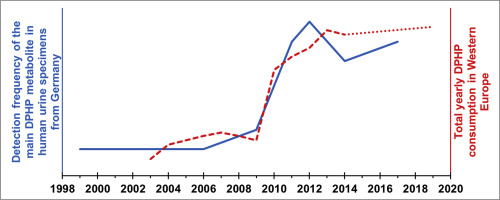Internal exposure of young German adults to di(2-propylheptyl) phthalate (DPHP): Trends in 24-h urine samples from the German Environmental Specimen Bank 1999-2017
Schmidtkunz, Christoph; Gries, Wolfgang; Weber, Till; Leng, Gabriele; Kolossa-Gehring, Marike
International Journal of Hygiene and Environmental Health (2019), online 14. Februar 2019
Abstract
Di(2-propylheptyl) phthalate (DPHP) is used as a substitute for high molecular weight phthalates like di(2-ethylhexyl) phthalate (DEHP) which were subjected to authorization under REACh in 2015. An earlier study on the time trend of exposure in human 24-h urine samples from the German Environmental Specimen Bank has revealed that metabolites of DPHP emerged in 2009 and 2012 (Schütze et al., 2015).
In order to better assess a potential trend and the present state of exposure to DPHP, we now measured 180 urine samples from the German Environmental Specimen Bank, 60 per year, collected in 2011, 2014 and 2017, randomized and blinded before analysis. Together with the previously analyzed samples, data for a total of 480 samples covering 19 years from 1999 to 2017 was thus generated. We were able to show that DPHP exposure of the studied population, university students from Münster (Northwestern Germany), has remained essentially constant since 2011, after a rapid increase starting around 2009. Even so, urinary metabolite concentrations were always in the low ppb or sub-ppb range, indicating that DPHP exposure of the general population is substantially lower than for other modern plasticizers, and far below levels currently regarded as critical.
DPHP is a plasticizer which is mostly used in non-sensitive applications with little probability of close contact to humans. Still, we observed how temporal trends of DPHP exposure largely follow trends of DPHP consumption in the Western European market. Our results hence demonstrate the potential of biomonitoring to sensitively detect the effects of industrial product strategy on the environment, even when biomarkers are present only at trace level.
doi: 10.1016/j.ijheh.2018.12.008
